
Carsharing
Encyclopedia
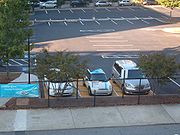
Car rental
A car rental or car hire agency is a company that rents automobiles for short periods of time for a fee...
where people rent cars for short periods of time, often by the hour. They are attractive to customers who make only occasional use of a vehicle, as well as others who would like occasional access to a vehicle of a different type than they use day-to-day. The organization renting the cars may be a commercial business or the users may be organized as a democratically controlled company, public agency, cooperative
Cooperative
A cooperative is a business organization owned and operated by a group of individuals for their mutual benefit...
, ad hoc grouping. Today there are more than one thousand cities in the world where people can carshare.
The term "carsharing" is also used for carpooling or ride sharing in some places.
Description
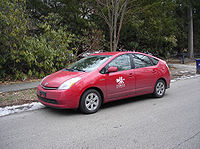

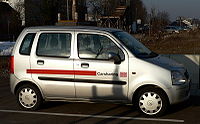
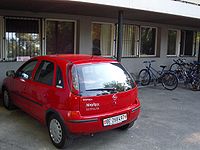
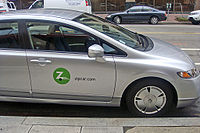
Dutch language
Dutch is a West Germanic language and the native language of the majority of the population of the Netherlands, Belgium, and Suriname, the three member states of the Dutch Language Union. Most speakers live in the European Union, where it is a first language for about 23 million and a second...
, autopartage in French
French language
French is a Romance language spoken as a first language in France, the Romandy region in Switzerland, Wallonia and Brussels in Belgium, Monaco, the regions of Quebec and Acadia in Canada, and by various communities elsewhere. Second-language speakers of French are distributed throughout many parts...
, bildeling in Danish
Danish language
Danish is a North Germanic language spoken by around six million people, principally in the country of Denmark. It is also spoken by 50,000 Germans of Danish ethnicity in the northern parts of Schleswig-Holstein, Germany, where it holds the status of minority language...
, automobile condivisa in Italian
Italian language
Italian is a Romance language spoken mainly in Europe: Italy, Switzerland, San Marino, Vatican City, by minorities in Malta, Monaco, Croatia, Slovenia, France, Libya, Eritrea, and Somalia, and by immigrant communities in the Americas and Australia...
and bilpool in Swedish
Swedish language
Swedish is a North Germanic language, spoken by approximately 10 million people, predominantly in Sweden and parts of Finland, especially along its coast and on the Åland islands. It is largely mutually intelligible with Norwegian and Danish...
. In the United Kingdom the term "car clubs" is used, while "car sharing" is also used to refer to ride sharing.
The principle of carsharing is simple: individuals gain the benefits of private cars without the costs and responsibilities of ownership. Instead of owning one or more vehicles, a household accesses a fleet of vehicles on an as-needed basis. Carsharing may be thought of as organized short-term car rental.
"Carpooling" or "ride-sharing" refers to the shared use of a car for a specific journey, in particular for commuting to work, often by people who each have a car but travel together to save costs. However, there is a slight terminological hitch in the UK where the term car sharing (two words in this usage) is used for what in the U.S. is called "ride sharing". Carsharing in the sense discussed in this article is a recent development in Britain, and while such plans are still more known as car clubs (a term which, in the U.S., refers strictly to a club of car hobbyists), the international term carsharing is gradually gaining currency there as well.
As is often the case with innovations that spring up more or less spontaneously in different parts of the world, operations are organized in many different ways in different places, according to the objectives of the organizers and users. A small informal start-up may have only one shared car, and only a handful of sharers. Larger services tend to focus on urban areas where there are many potential customers.
Carsharing differs from traditional car rentals in the following ways:
- Carsharing is not limited by office hours
- Reservation, pickup, and return is all self-service
- Vehicles can be rented by the minute, by the hour, as well as by the day
- Users are members and have been pre-approved to drive (background driving checks have been performed and a payment mechanism has been established)
- Vehicle locations are distributed throughout the service area, and often located for access by public transportPublic transportPublic transport is a shared passenger transportation service which is available for use by the general public, as distinct from modes such as taxicab, car pooling or hired buses which are not shared by strangers without private arrangement.Public transport modes include buses, trolleybuses, trams...
. - Insurance and fuel costs are included in the rates.
- Vehicles are not serviced (cleaning fueling) after each use, although certain programs such as Car2GoCar2GoCar2Go is a subsidiary of Daimler AG that provides carsharing services in several cities in Europe and North America. In November 2011 the world's first all-electric carsharing network was launched in San Diego, California, with a fleet of 300 Smart EDs...
continuously clean and fuel their fleet
Some carshare operations (CSOs) cooperate with local car rental firms to offer best value to their customers (in particular in situations where classic rental may be the cheaper option.)
An increasing body of empirical evidence indicates that carsharing can provide numerous transportation, land use, environmental, and social benefits.
Neighborhood carsharing is often promoted as an alternative to owning a car where public transit, walking, and cycling
Cycling
Cycling, also called bicycling or biking, is the use of bicycles for transport, recreation, or for sport. Persons engaged in cycling are cyclists or bicyclists...
can be used most of the time and a car is only necessary for out-of-town trips, moving large items, or special occasions. It can also be an alternative to owning multiple cars for households with more than one driver. A long-term study of City CarShare members by Robert Cervero, Professor of City and Regional Planning at the University of California, Berkeley
University of California, Berkeley
The University of California, Berkeley , is a teaching and research university established in 1868 and located in Berkeley, California, USA...
, found that 30 percent of households that joined sold a car; others delayed purchasing one. Transit use, bicycling, and walking also increased among members. A study of driving behavior of members from major carsharing organizations found an average decline in 27% of annual VKT.
Car sharing is generally not cost-effective for commuting to a full-time job on a regular basis. Most carsharing advocates, operators and cooperating public agencies believe that those who do not drive daily or who drive less than 10,000 kilometers (about 6,200 statute miles) annually may find carsharing to be more cost-effective than car ownership. But variations of 50% on this figure are reported by operators and others depending on local context. If occasional use of a shared vehicle costs significantly less than car ownership, this makes automobile use more accessible to low-income households.
Car sharing can also help reduce congestion and pollution. Replacing private automobiles with shared ones directly reduces demand for parking spaces. The fact that only a certain number of cars can be in use at any one time may reduce traffic congestion
Traffic congestion
Traffic congestion is a condition on road networks that occurs as use increases, and is characterized by slower speeds, longer trip times, and increased vehicular queueing. The most common example is the physical use of roads by vehicles. When traffic demand is great enough that the interaction...
at peak times
Rush hour
A rush hour or peak hour is a part of the day during which traffic congestion on roads and crowding on public transport is at its highest. Normally, this happens twice a day—once in the morning and once in the evening, the times during when the most people commute...
. Even more important for congestion, the strong metering of costs provides a cost incentive to drive less. With owned automobiles many expenses are sunk costs and thus independent of how much the car is driven (such as original purchase, insurance, registration and some maintenance).
Successful carsharing development has tended to be associated mainly with densely populated areas such as city centers and more recently university and other campuses. There are some programs (mostly in Europe) for providing services in lower density and rural areas. Low-density areas are considered more difficult to serve with car sharing because of the lack of alternative modes of transportation and the potentially larger distance that users must travel to reach the cars.
People who have joined car sharing sell either their primary, secondary, or another off-hand car, after using the service. This reduces the cost of transportation per month by an average of $135 – $435, based on University of Berkeley's Research in 2008.
How it works
The technology of CSOs varies enormously, from simple manual systems using key boxes and log books to increasingly complex computer-based systems (e.g. partially automated and fully automated systems) with supporting software packages that handle a growing array of back office functions. The simplest CSOs have only one or two pick-up points, but more advanced systems allow cars to be picked up and dropped off at any available public parking space within a designated operating area.While differing markedly in their objectives, size, business models, levels of ambition, technology and target markets, these programs do share many features. The more established operations usually require a check of past driving records and a monthly or annual fee in order to become a member. The cost and maximum time a car may be used also varies.
To make a reservation, one can either make a reservation online, by phone, or by text messages depending on the company’s flexibility. Then the company usually asks all the necessary information such as:
- What time will the car be needed?
- How long will the car be in use?
- Where would you like to pick up the car?
- What type of car is preferred?
There is a higher chance of availability the earlier the reservation is. If a reservation is cancelled however, one may still be charged.
Once the reservations are completed and confirmed, the car will then be delivered at the time and place scheduled. There will be a small card reader mounted on the windshield. Once the customer places their membership card on the reader, it will use what is called blink technology to activate the time and unlock the car. The reader will not work until it is time for that specific reservation. The keys can then be found somewhere inside the car such as the glove compartment. Depending on the company, the customer may be provided with a key to a lock box that contains the ignition key itself. Once the customer is set, they are off to their next destination.
Although members are often responsible for cleaning the car and filling up the tank when low, the car sharing company is generally responsible for the long-term maintenance of the vehicles. Members have to make sure that when they are finished, the car is ready for the next user to move on.
History

Housing cooperative
A housing cooperative is a legal entity—usually a corporation—that owns real estate, consisting of one or more residential buildings. Each shareholder in the legal entity is granted the right to occupy one housing unit, sometimes subject to an occupancy agreement, which is similar to a lease. ...
that got underway in Zürich
Zürich
Zurich is the largest city in Switzerland and the capital of the canton of Zurich. It is located in central Switzerland at the northwestern tip of Lake Zurich...
in 1948, but there was no known formal development of the concept in the next few years. By the 1960s as innovators, industrialists, cities, and public authorities studied the possibility of high-technology transportation—mainly computer-based small vehicle systems (almost all of them on separate guideways)—it was possible to spot some early precursors to present-day service ideas and control technologies.
The early 1970s saw the first whole-system carshare projects. The ProcoTip system in France lasted only about two years. A much more ambitious project called the Witkar
Witkar
The Witkar was one of the first technology-based carsharing projects in the world. It is the invention of Dutch social inventor and politician Luud Schimmelpennink, an industrial designer and at the time Amsterdam city councilor...
was launched in Amsterdam by the founders of the 1968 white bicycles project. A sophisticated project based on small electric vehicles, electronic controls for reservations and return, and plans for a large number of stations covering the entire city, the project endured into the mid-1980s before finally being abandoned.
The 1980s and first half of the 1990s was a "coming of age" period for carsharing, with continued slow growth, mainly of smaller non-profit systems, many in Switzerland
Switzerland
Switzerland name of one of the Swiss cantons. ; ; ; or ), in its full name the Swiss Confederation , is a federal republic consisting of 26 cantons, with Bern as the seat of the federal authorities. The country is situated in Western Europe,Or Central Europe depending on the definition....
and Germany
Germany
Germany , officially the Federal Republic of Germany , is a federal parliamentary republic in Europe. The country consists of 16 states while the capital and largest city is Berlin. Germany covers an area of 357,021 km2 and has a largely temperate seasonal climate...
, but also on a smaller scale in Sweden
Sweden
Sweden , officially the Kingdom of Sweden , is a Nordic country on the Scandinavian Peninsula in Northern Europe. Sweden borders with Norway and Finland and is connected to Denmark by a bridge-tunnel across the Öresund....
, the Netherlands
Netherlands
The Netherlands is a constituent country of the Kingdom of the Netherlands, located mainly in North-West Europe and with several islands in the Caribbean. Mainland Netherlands borders the North Sea to the north and west, Belgium to the south, and Germany to the east, and shares maritime borders...
, Canada
Canada
Canada is a North American country consisting of ten provinces and three territories. Located in the northern part of the continent, it extends from the Atlantic Ocean in the east to the Pacific Ocean in the west, and northward into the Arctic Ocean...
and the United States
United States
The United States of America is a federal constitutional republic comprising fifty states and a federal district...
. The real watershed in the development of the sector came in the 1990s with such larger and more structured projects as
- StattAutoStattAutoStattAuto CarSharing GmbH, Berlin, was the first carsharing corporation in Germany and the second worldwide. It changed its name to Greenwheels AG in 2005.-History:...
in Germany - cambio CarSharingCambio CarSharingcambio CarSharing is a carsharing company which was formed in 2000 as a merger of several carsharing companies in different cities. It enables the use of cars, so that customers, as far possible, do not need to own a car - hence the term "car sharing"....
in Germany - the two precursors of Mobility CarSharing in Switzerland
- GreenwheelsGreenwheelsGreenwheels is the largest carsharing corporation in the Netherlands.In 2004, the biggest and most successful carsharing company of the Netherlands, Collect Car B.V., Rotterdam, - better known by its trademark 'Greenwheels' - bought the majority of the shares of StattAuto, a German carsharing...
in the Netherlands. - CommunautoCommunautoCommunauto is a company based in Montreal, Quebec, Canada, that operates a carsharing service in 4 cities in Quebec: Montreal, Quebec City, Gatineau and Sherbrooke. It currently has 25,000 users who share a fleet of approximately 1300 vehicles...
in CanadaCanadaCanada is a North American country consisting of ten provinces and three territories. Located in the northern part of the continent, it extends from the Atlantic Ocean in the east to the Pacific Ocean in the west, and northward into the Arctic Ocean...
Follow up developments include
- CommunAuto, then Co-operative Auto Network and later AutoShareAutoShareAutoShare is a car sharing company in Toronto, Ontario, Canada. The service was launched in October 1998 with 16 initial members and three cars. As of June 2009, AutoShare has over 10,000 members and over 200 cars, available for use 24 hours per day...
in Canada - FlexcarFlexcar-External links:***...
(now merged with ZipcarZipcarZipcar is an American membership-based car sharing company providing automobile reservations to its members, billable by the hour or day. Zipcar was founded in 2000 by Cambridge, Massachusetts residents Antje Danielson and Robin Chase, and is now led by Scott Griffith, Chairman and Chief Executive...
) in Portland, OregonPortland, OregonPortland is a city located in the Pacific Northwest, near the confluence of the Willamette and Columbia rivers in the U.S. state of Oregon. As of the 2010 Census, it had a population of 583,776, making it the 29th most populous city in the United States... - ZipcarZipcarZipcar is an American membership-based car sharing company providing automobile reservations to its members, billable by the hour or day. Zipcar was founded in 2000 by Cambridge, Massachusetts residents Antje Danielson and Robin Chase, and is now led by Scott Griffith, Chairman and Chief Executive...
in BostonBostonBoston is the capital of and largest city in Massachusetts, and is one of the oldest cities in the United States. The largest city in New England, Boston is regarded as the unofficial "Capital of New England" for its economic and cultural impact on the entire New England region. The city proper had... - Community Car in MadisonMadison- Place names :* Madison, Wisconsin, the largest city by the name and the state capital of Wisconsin* Madison, Alabama* Madison, Arkansas* Madison, California* Madison, Connecticut* Madison, Florida* Madison, Georgia* Madison, Illinois* Madison, Indiana...
- WhizzGoWhizzgoWhizzGo is a United Kingdom car sharing Car Club providing pay-by-the-hour cars in 12 cities. Pay-by-the-hour cars are provided for a small hourly price which includes insurance, tax, fuel, maintenance and the Congestion Charge for London cars. WhizzGo advertises a cheaper, simpler and greener way...
in EnglandEnglandEngland is a country that is part of the United Kingdom. It shares land borders with Scotland to the north and Wales to the west; the Irish Sea is to the north west, the Celtic Sea to the south west, with the North Sea to the east and the English Channel to the south separating it from continental... - CityCarClub in England and ScotlandScotlandScotland is a country that is part of the United Kingdom. Occupying the northern third of the island of Great Britain, it shares a border with England to the south and is bounded by the North Sea to the east, the Atlantic Ocean to the north and west, and the North Channel and Irish Sea to the...
- GoGetGoGetGoGet CarShare is a car sharing service operating in Sydney, Melbourne and Adelaide, and the first such program in Australia. GoGet was launched as Newtown CarShare on 6 June 2003 with three vehicles and twelve founding members. Following interest from the City of Darebin, the service was...
in AustraliaAustraliaAustralia , officially the Commonwealth of Australia, is a country in the Southern Hemisphere comprising the mainland of the Australian continent, the island of Tasmania, and numerous smaller islands in the Indian and Pacific Oceans. It is the world's sixth-largest country by total area...
followed by Smartdrivers in mid 2007 - Car2GoCar2GoCar2Go is a subsidiary of Daimler AG that provides carsharing services in several cities in Europe and North America. In November 2011 the world's first all-electric carsharing network was launched in San Diego, California, with a fleet of 300 Smart EDs...
, first in Ulm, GermanyUlmUlm is a city in the federal German state of Baden-Württemberg, situated on the River Danube. The city, whose population is estimated at 120,000 , forms an urban district of its own and is the administrative seat of the Alb-Donau district. Ulm, founded around 850, is rich in history and...
in October 2008 then Austin, TexasAustin, TexasAustin is the capital city of the U.S. state of :Texas and the seat of Travis County. Located in Central Texas on the eastern edge of the American Southwest, it is the fourth-largest city in Texas and the 14th most populous city in the United States. It was the third-fastest-growing large city in...
in May 2010 - GoCarGoCar (carsharing)GoCar is the first Carsharing service in Ireland. It launched in Cork City in September 2008, with the support of Cork City Council as a pilot scheme.It expanded to Dublin in September 2010, and is now in 10 locations in Dublin....
in IrelandIrelandIreland is an island to the northwest of continental Europe. It is the third-largest island in Europe and the twentieth-largest island on Earth... - Autolib' that will operate 3,000 electric carElectric carAn electric car is an automobile which is propelled by electric motor, using electrical energy stored in batteries or another energy storage device. Electric cars were popular in the late-19th century and early 20th century, until advances in internal combustion engine technology and mass...
s and schedule to open in Paris in December 2011.
As of November 2011 the largest service in the world was Zipcar
Zipcar
Zipcar is an American membership-based car sharing company providing automobile reservations to its members, billable by the hour or day. Zipcar was founded in 2000 by Cambridge, Massachusetts residents Antje Danielson and Robin Chase, and is now led by Scott Griffith, Chairman and Chief Executive...
with 650,000 members (called "Zipsters"), and 9,400 vehicles across 19 major cities and over 250 college campuses. Prior data from 2010 suggests Zipcar accounts for 80% of the U.S car sharing market and half of all car-sharers worldwide.
Several car rental
Car rental
A car rental or car hire agency is a company that rents automobiles for short periods of time for a fee...
companies launched their own car sharing services beginning in 2008, including Hertz on Demand (formerly known as Connect by Hertz), operating in the U.S. and Europe; WeCar by Enterprise Rent-A-Car; and U Car Share
U Car Share
UhaulCarShare is a for-profit carsharing service offered by U-Haul in selected cities across the United States, billable hourly or by the day.-Schools Served:* University of Utah* Lynn University* Kenyon College* Northwood University...
owned by U-Haul
U-Haul
U-Haul International, Inc. is an American equipment rental company, based in Phoenix, Arizona, that has been in operation since 1945. The company was founded by Leonard Shoen U-Haul International, Inc. is an American equipment rental company, based in Phoenix, Arizona, that has been in operation...
.
In 2010 a new approach to carsharing began to be implemented, based on a peer-to-peer
Peer-to-peer
Peer-to-peer computing or networking is a distributed application architecture that partitions tasks or workloads among peers. Peers are equally privileged, equipotent participants in the application...
model. Examples of peer-to-peer car rental
Peer-to-peer car rental
Peer-to-peer car rental is the process whereby an existing car owner makes their vehicle available for use to other drivers in their area in exchange for payment...
include
- GetaroundGetaroundGetaround is an online car sharing or peer-to-peer car rental service that allows drivers to rent cars from private car owners, and owners to rent out their cars for payment. Owners set their rental prices and earn a 60% commission from their rental revenue....
in San Francisco Bay AreaSan Francisco Bay AreaThe San Francisco Bay Area, commonly known as the Bay Area, is a populated region that surrounds the San Francisco and San Pablo estuaries in Northern California. The region encompasses metropolitan areas of San Francisco, Oakland, and San Jose, along with smaller urban and rural areas... - RelayRidesRelayRidesRelayRides is a peer-to-peer car rental or carsharing service. It allows private car-owners to rent out their vehicles on a short-term basis, via an online interface....
in San Francisco and BostonBostonBoston is the capital of and largest city in Massachusetts, and is one of the oldest cities in the United States. The largest city in New England, Boston is regarded as the unofficial "Capital of New England" for its economic and cultural impact on the entire New England region. The city proper had... - Spride Share in San Francisco
- TransportChain
- Go-OpGo-OpGo-Op is a early stage company headquartered in Pittsburgh, PA attempting to develop a person-2-person car sharing service. Go-Op was founded in 2010 by Carnegie Mellon University faculty member Robert Hampshire and by Craig Gaites and Jay Sizemore, students at Carnegie Mellon's Tepper School of...
in Pittsburgh
Handicapped accessibility
Adapting carsharing vehicles to persons with physical disabilitiesPhysical disability
A physical disability is any impairment which limits the physical function of one or more limbs or fine or gross motor ability. Other physical disabilities include impairments which limit other facets of daily living, such as respiratory disorders and epilepsy....
presents special challenges not faced by traditional car rental
Car rental
A car rental or car hire agency is a company that rents automobiles for short periods of time for a fee...
. With car sharing no mechanic is present to install or adjust adaptive equipment, and that equipment is left unattended after each use. In 2008 City CarShare introduced the first wheelchair carrying car share vehicle, the Access Mobile, specifically designed as a fleet vehicle shared with, not segregated from, non-wheelchair users.
Innovations
Car sharing operators are increasingly opting to brand parts of their fleets with third-party advertising in order to increase revenue and improve competitiveness. Transit mediaTransit media
Transit media is a form of out-of-home advertising that uses vehicular platforms to establish a mobile brand presence.Typically, transit media campaigns are employed in denser urban environments to maximize brand exposure to both pedestrian and on-road traffic...
, as this out-of-home advertising
Out-of-home advertising
Out-of-home advertising is made up of more than 100 different formats, totaling $6.99 billion in annual revenues in 2008 in the USA. Outdoor advertising is essentially any type of advertising that reaches the consumer while he or she is outside the home...
medium is referred to, is a strategy currently (or soon to be) employed by larger car sharing operators such, Canada's AutoShare
AutoShare
AutoShare is a car sharing company in Toronto, Ontario, Canada. The service was launched in October 1998 with 16 initial members and three cars. As of June 2009, AutoShare has over 10,000 members and over 200 cars, available for use 24 hours per day...
and the UK's City Car Club
City Car Club
City Car Club is one of the leading car club operators in the UK. Established in 2000 and with over 500 vehicles, it is the oldest and one of the largest Car Clubs operating at a national scale in the country. Operating a range of low-emissions vehicles, it uses the now standard technologies of...
, as well as smaller operators such as Australia's Charter Drive Car Share.
For future applications, many car sharing companies are now investing in plug-in hybrid electric vehicles (PHEV). With the use of these types of vehicles, cost of gas consumption can be greatly reduced. Since most customers do not need the vehicle for long amounts of time or distance, it gives the car sharing company time to collect and recharge these vehicles for additional use. This application can greatly reduce carbon emissions and improve city environments.
Also, car sharing can be considered as an example of a technological change in consumption, which is a ‘process of mutual adjustment between innovation and its socio-economic environment.’ This type of innovation poses much potential due to the current state of technological change based on today’s passenger transportation capabilities.
Other countries are already moving into designing concept cars that is solely based as an urban public vehicle. The Phiaro P70t Conch, Japan’s new concept vehicle, is a completely battery powered, three-seater vehicle which was designed for the purpose of car sharing. The vehicle was made to be small and compact enough to be driven around urban environments without sacrificing parking. The promotion of these kinds of concept vehicles have caught the attention of automotive companies worldwide.
See also
- Alternatives to the automobileAlternatives to the automobileEstablished alternatives for some aspects of automobile use include public transit , cycling, walking, rollerblading and skateboarding. Car-share arrangements are also increasingly popular – the U.S...
- HitchhikingHitchhikingHitchhiking is a means of transportation that is gained by asking people, usually strangers, for a ride in their automobile or other road vehicle to travel a distance that may either be short or long...
- Car rentalCar rentalA car rental or car hire agency is a company that rents automobiles for short periods of time for a fee...
- Carpooling
- Peer-to-peer car rentalPeer-to-peer car rentalPeer-to-peer car rental is the process whereby an existing car owner makes their vehicle available for use to other drivers in their area in exchange for payment...
- Momo car-sharingMomo car-sharingMomo Car-Sharing is an project intended to promote a sustainable mobility culture supporting various transport options aside from car ownership. It has a total budget of 2,693,644 €, 50% co-financed by the European Union...
European demonstration project on carsharing
External links
- Car Sharing.Canada
- Car-Sharing Instant Advocate
- What is Car Sharing and How Does it Work? - A primer on car sharing.

